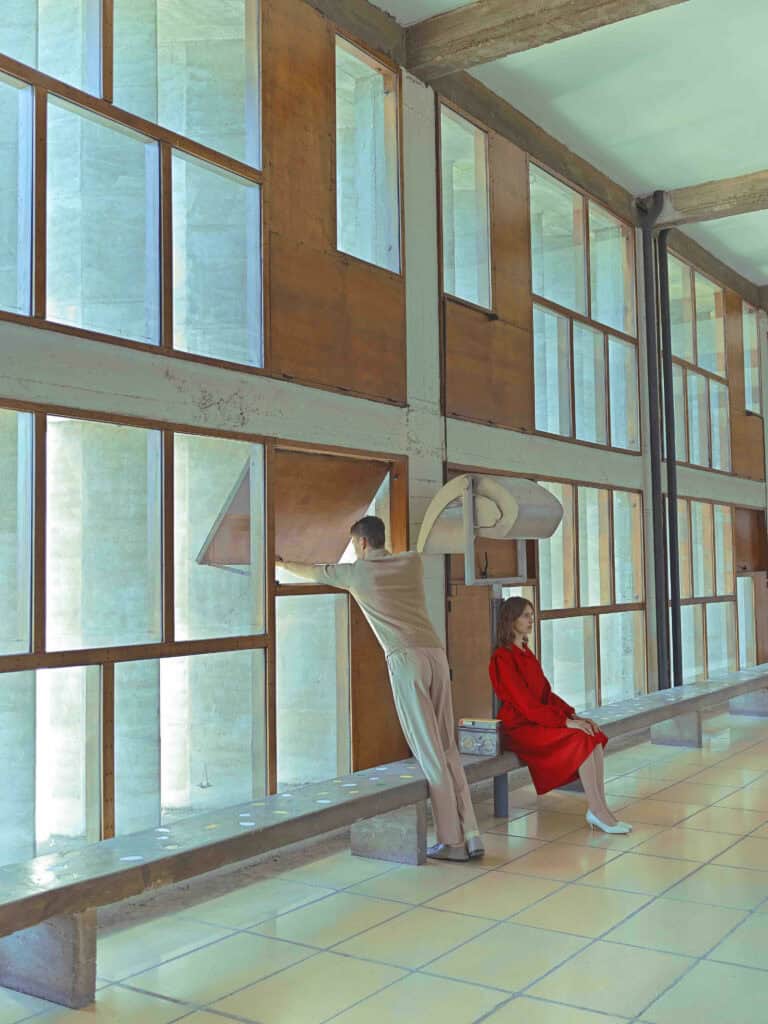This summer, Marseille’s Radiant City will host a series of original pictures devoted by photographer Maria Svarbova to the “vertical village” designed by Le Corbusier. In this work, the artist builds upon her privileged themes – modernist aesthetics and social distancing between individuals, to deliver both a mythological reflection on our experience of isolation, and a luminous tribute to the genius of the place.
Kolektiv Cité Radieuse, the gallery devoted to visual arts and design from Central and Eastern Europe established at Le Corbusier Housing Unit, Marseille, invited Slovak photographer Maria Svarbova to realize a series of 20 pictures exploring the relation between human beings and the “machine for living” designed by the emblematic architect. Although bearing the unmistakable mark of their author, in line with her vision of the relationship of individuals to modernist aesthetics – including its impersonal and standardized traits, these photographs constitute a new milestone in her visual journey.
The blinding light of the Mediterranean, the whitened concrete that reminds of the surrounding mountains or the wooden prints texturing the walls of the Housing Unit thus create natural interferences in her otherwise strictly urban aesthetics. The story of incommunicability between a man and a woman told by these pictures, also powerfully resonates with our postCovid-19 environment, put in perspective by multiple references to Greek mythology, from Apollo and Daphne to the fall of Icarus, from Medusa to the Caryatids and the Atlantes…
Bringing a new layer to the themes that made her one of the most acclaimed photographers of her generation, Maria Svarbova not only reflects upon our times of social distancing and isolation, but also delivers a tribute to the genius loci: the one of a city founded by Greeks over 2600 years ago, and the one of the Cité Radieuse, embodying the principles of 20th Century’s most revered architect.
Subtle tension
Maria Svarbova was born in Slovakia in 1988, on the eve of the collapse of the Soviet bloc. She grew up in a country where socialist architecture had left a profound mark on the urban landscape, providing some of the landmarks cities are made of. This orderly but somewhat derelict environment of concrete is the decor of Maria’s work, which evokes a life that used to be simple and humble, as much as tightly socially controlled. This ambivalence is revealed in pictures of mundane, stereotyped and choregraphed activities (wrapping meat at the butcher, sitting in a waiting room or undergoing routine medical examination) executed by subjects/models whose faces and attitudes express an absence of emotions. This sanitized environment with limited human interactions, that powerfully resonates with our post-Covid19 crisis environment, creates a subtle tension which is arguably Maria Svarbova’s trademark. These fictitious documents also receive a touch of modern freshness thanks to their composition, chromatic palette and to the presence of a diverse cast of models that contribute to enhance their timelessness.
Hungry for more?From the series Swimming pools, which first garnered international acclaim to the series Plastic People or Human Space, the dream-like scenes captured by Maria Svarbova, where the recent past, the present and a dystopian future conflagrate, explore the loneliness of human experience.
This is why her work, presented in solo and group exhibitions in Mexico, Taipeh, New York or Madrid, has been met with considerable international interest, featuring in Vogue, Forbes or The Guardian, with a commissioned work for Apple (2019). She received the Award Hasselblad Master Art 2018. About staging: 20 large format pictures will be displayed both in public and private spaces of the Housing Unit. Scenography follows the narrative of a story of incommunicability, drawing references to mythological figures of Ancient Greece. Starting in the main entrance hall of the building, conceived by Le Corbusier as a public square, it continues on the 3rd (public) floor, first with Gallery Kolektiv Cité Radieuse, then in the winter garden, with a provisional epilogue. A post-scriptum will be accessible to the press or upon reservation1 on 5th floor, in a private flat having conserved all its original components by Charlotte Perriand, Le Corbusier and Jean Prouvé, concluding the visit.
Curator: Laura Serra Forest. Born in Madrid, she is a graduate of the French Design and Fashion Institute in Paris and the founder of Kolektiv Cité Radieuse for which she explores the interpretation of 20th century architecture through design, textile and photography. She has been recently commissioned a collective design residence on interpreting modernism for Kaunas 2022, European Culture Capital.
Dates: June 26th – August 27th, 2021 280 Boulevard Michelet, 13008 Marseille, France
[material: press information]














